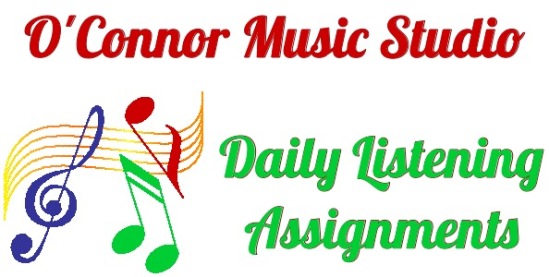National Donald Duck Day is observed annually on June 9th. This day commemorates the birthday of the funny animal cartoon character, Donald Duck. Donald made his first screen debut on June 9, 1934, in The Wise Little Hen.
More about National Donald Duck Day
Be sure your student reads and listens to Today’s Daily Listening Assignment
• 1361 ~ Philippe de Vitry, French Composer and poet, died at the age of at 69
• 1656 ~ Thomas Tomkins, Composer, died
• 1717 ~ Louis Le Quointe, Composer, died at the age of 64
• 1810 ~ (Carl) Otto (Ehrenfried) Nicolai, Composer
More information about Nicolai
• 1828 ~ Carlo Marsili, Composer
• 1829 ~ Gaetano Braga, Composer
• 1832 ~ Manuel Garcia, Composer, died at the age of 57
• 1849 ~ Joseph Vezina, Composer
• 1849 ~ The term recital used for the first time to describe a solo performance by an instrumental player. The first recitalist was Franz Liszt
• 1865 ~ Carl Nielsen, Danish composer and conductor
More information about Nielsen
• 1865 ~ Alberic Magnard, Composer
• 1870 ~ Erik Drake, Composer, died at the age of 82
• 1879 ~ Oscar Back, Austrian-Dutch viola player
• 1886 ~ Kusaku Yamada, Composer
• 1888 ~ Hugo Kauder, Composer
• 1890 ~ The opera “Robin Hood” premiered in Chicago
• 1891 ~ Cole Porter, American composer and lyricist for the musical theater. His many famous musicals include “Anything Goes”, “Kiss Me Kate” and “Can Can”.
More information about Porter
• 1892 ~ Friedrich Wilhelm Langhans, Composer, died at the age of 59
• 1900 ~ Fred Waring, Musician, conductor and inventor of the Waring Blender
• 1904 ~ The London Symphony Orchestra presented its inaugural concert.
• 1905 ~ Walter Kraft, Composer
• 1912 ~ Edgar Evans, Tenor
• 1914 ~ Hermann Haller, Composer
• 1915 ~ Les Paul, Guitarist and inventor of the Les Paul guitar
• 1924 ~ Jelly-Roll Blues was recorded by blues great, Jelly Roll Morton
• 1927 ~ Franco Donatoni, Composer
• 1931 ~ Henrique Oswald, Composer, died at the age of 79
• 1932 ~ Natalia Janotha, Composer, died at the age of 76
• 1904 ~ Pal Karolyi, Composer
• 1934 ~ Jackie Wilson, Singer
• 1934 ~ Wild Jimmy Spruill, blues guitarist
• 1938 ~ Charles Wuorinen, American composer, won the Pulitzer Prize in 1980
• 1957 ~ Robert Oboussier, Composer, died at the age of 56
• 1958 ~ Purple People Eater by Sheb Wooley hit #1
• 1962 ~ Tony Bennett debuted in concert at Carnegie Hall in New York City
• 1963 ~ Barbra Streisand appeared on “Ed Sullivan Show”
• 1967 ~ Stefan Boleslaw Poradowski, Composer, died at the age of 64
• 1970 ~ Bob Dylan given honorary Doctorate of Music at Princeton University
• 1971 ~ Paul McCartney’s album “Ram” went gold
• 1972 ~ Bruce Springsteen signed a record deal with Columbia
• 1975 ~ David Frederick Barlow, Composer, died at the age of 48
• 1975 ~ Tony Orlando and Dawn received gold record for He Don’t Love You
• 1980 ~ Fourteenth Music City News Country Awards, Statler Brothers & Loretta Lynn
• 1984 ~ Cyndi Lauper’s first #1 Time After Times
• 1986 ~ Twentieth Music City News Country Awards, Statler Brothers & Loretta Lynn
• 1990 ~ Michael Jackson was hospitalized with inflamed rib cartilage
• 1991 ~ Claudio Arrau, Chilian/American pianist and composer, died at the age of 88
• 1991 ~ Bruce Springsteen wed his backup singer Patty Scialfa
• 1991 ~ Max van Praag, Dutch singer, died at the age of 77
• 1992 ~ Clarence Miller, Blues/jazz vocalist, died at the age of 69 of a heart attack
• 1993 ~ Arthur Alexander, Singer/songwriter, died at the age of 53
• 1995 ~ Frank Chacksfield, Conductor/arranger, died at the age of 81
• 2000 ~ Jazz bassist Burgher “Buddy” Jones, who played in big bands behind Peggy Lee and Frank Sinatra and toured with Harry James and Tommy Dorsey, died at the age of 76.
A native of Hope, Ark., Jones was a childhood friend of the late Virginia Kelley, mother of President Clinton. At 17, Jones went to the University of Kansas City, where he met and befriended saxophonist Charlie Parker. Jones later introduced Parker to his wife, Chan. Jones played in the Elliot Lawrence band, when its arrangers included Al Cohn, Tiny Kahn and Johnny Mandel. As a staff musician for CBS in New York in the 1950s and 1960s,
Jones played for the Jack Sterling radio show and in bands behind Lee and Sinatra. In 1996, Jones was inducted into the Arkansas Jazz Hall of Fame.
• 2020 ~ Bonnie Pointer, who rose to fame as a member of the Pointer Sisters, died at age 69.






